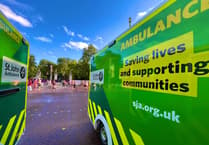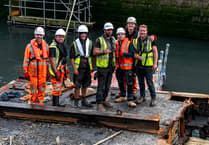The upcoming Easter school holidays will see RNLI lifeguards return to beaches across Cornwall.
From Saturday, April 1 to Sunday, April 16, a total of 23 beaches across the South West will be patrolled by RNLI lifeguards after a busy two weeks of pre-season training, which has included essential skills in casualty care, fitness testing, lifesaving skills in and out of the water and water craft operations.
RNLI figures reveal that in 2022, eight million people visited an RNLI lifeguarded beach in Cornwall and RNLI lifeguards saved 23 lives, as well as dealing with nearly 7,000 incidents and assisting over 8,000 people.
The RNLI works in partnership with councils and private beach owners each year to set up and roll out a lifeguard service at their request.
Setting up a lifeguard service each season involves several different elements including recruiting, training lifeguards and organising the logistics to deliver equipment and in some cases lifeguard units to each beach.
For the two-week school Easter Holidays (April 1- April 16) the following beaches in Cornwall will be patrolled by RNLI lifeguards: Tregonhawke, Praa Sands, Fistral, Towan, Sennen, Porthmeor, Hayle, Gwithian, Porthtowan, Perranporth, Watergate Bay, Mawgan Porth, Constantine, Harlyn, Polzeath, Widemouth and Summerleaze.
Patrols will continue daily at Fistral, Perranport, Porthmeor and Sennen until the end of September, while patrols on a number of other beaches will have weekend cover and return daily for the summer on Saturday, April 29, following the Easter holidays.
Tim Fallowfield, lead lifeguard supervisor in Cornwall, said: “‘The RNLI has been working closely with the Council and local communities to ensure the beaches and lifeguard units are ready and equipped, and that lifeguard training has been performed seamlessly.
“Pre-season preparations are in full swing and the charity’s lifeguards are eager to return to the beaches and do what they do best - offering preventative safety advice to visitors and rescuing those in difficulty in the water or on the beach itself.
“We'd highly recommend people to head to one of our RNLI lifeguarded beaches this Easter and speak to the lifeguards to find out the local beach risks, tides and weather conditions.
“Good weather would be most welcome, however it’s important to remember that the water is usually at its coldest at this time of the year which increases the risk of cold water shock.
“Additionally, the winter weather at your local beach might have altered the landscape and terrain, so it's essential to familiarise yourself with any new hazards such as rips or exposed rocks.
“Be prepared for whatever water activity you have planned, and always have a means of calling for help. We wish everyone a safe and happy Easter.”
Cornwall Council invests each year in keeping their beach visitors safe by contributing to RNLI costs, which helps to meet lifeguard wages, while the extensive training and equipment needed is provided by the charity through public donations.
Councillor Martyn Alvey, portfolio holder for environment and climate change at Cornwall Council, said: “It’s great to see lifeguards returning to the beaches as we enter the Easter holidays.
“Each year they rescue dozens of people and help prevent tragedies. Remember to follow their advice and please stay safe when visiting our beautiful beaches.”





Comments
This article has no comments yet. Be the first to leave a comment.